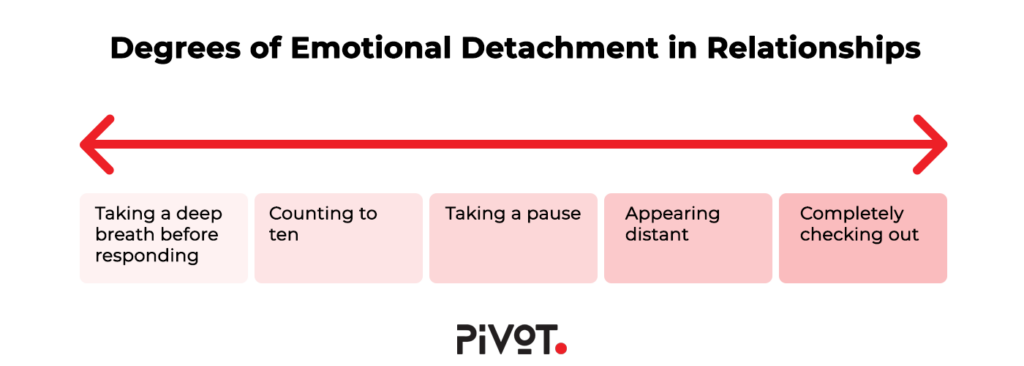Relationships can be a rollercoaster of emotions, and it’s okay to feel overwhelmed at times. You’re not alone in this. Many people experience the highest highs and the lowest lows in their closest connections. For this reason, taking a brief step back from heightened emotions may be necessary to avoid saying or doing something you regret. However, more extended periods of emotional detachment in relationships may be cause for concern.
While temporarily stepping back from stress can be healthy for you and your partner, completely disengaging can spell disaster for your relationship. If your relationship lacks intimacy and closeness or you feel significantly disconnected from your partner, it’s time to get help. Overcoming emotional detachment in relationships is not just about healing but also about growth and learning. It’s a journey that can lead to a deeper understanding of yourself and your partner.
Recognizing and Coping With Emotional Detachment in a Long-Term Partnership
You may notice emotional detachment when a sudden situation puts pressure on your relationship, or it may develop over time as you drift further apart. While you may wonder what you did to cause the rift, remember that its origins may predate your relationship. Nonetheless, the effects of the emotional distance from your partner may quickly take a toll on your relationship.
Emotional detachment in a marriage or other long-term partnership can be particularly problematic. Not only do you feel alone without the intimacy and closeness you once shared, but your lack of meaningful connection may get in the way of day-to-day living, shared responsibilities, and critical decisions.
If you notice emotional detachment from your partner, it may be possible to work on it together.
Coping With Emotional Detachment in a Relationship |
|
|
Practice self-care |
Be patient and gentle with yourself so that you can be caring and supportive of your spouse and your relationship. Sometimes, it will take time to gain understanding and find a way to reclaim emotional intimacy. |
|
Remember the good times |
Reflect on the good times and try to focus on the positives of your relationship. This may help you gain a new perspective and give you valuable insights. |
|
Put yourself in your partner’s shoes |
Try to see your relationship from your partner’s perspective. Listen to their position and attempt to understand their wants and needs. Share openly with your partner as well. The goal is to find common ground on which to rebuild your relationship. |
|
Make an effort |
Start with a small gesture or by introducing the spirit of thoughtfulness and surprise back into your relationship. Try to be creative and show that you care. Rebuilding your relationship on honesty, trust, and self-awareness is more likely to be successful, and a little effort often goes a long way. |
|
Get help from a relationship coach |
Since emotional detachment could be based on past traumas and attachment wounds, you and your partner might benefit from the help of a relationship coach. An experienced professional coach can help uncover the reasons behind the use of emotional detachment as a survival pattern. |
Is Emotional Detachment in Relationships Ever a Positive Thing?
If you notice emotional detachment in yourself or your partner, there is no need to panic. Emotional detachment isn’t always a bad thing; in fact, sometimes it can be quite healthy. It isn’t black and white; detachment exists on a spectrum, and as with most things in life, it’s all about balance.

Short-term emotional detachment may be beneficial when emotions interfere with peaceful, productive communication or problem-solving. This “time out” can be a helpful strategy for managing communication in a relationship.
Times when emotional detachment may be a proactive strategy include:
- Taking a step back to calm down
- Tabling a conversation when emotions are running high
- Taking time to compose your thoughts
- Setting and maintaining reasonable boundaries
- Scheduling a time for a hard conversation
This type of controlled detachment can provide a healthy buffer and prevent reacting in the heat of the moment when your emotions may override your better judgment.
What Causes Emotional Detachment in Relationships?
Emotional detachment may occur at any stage of a relationship. It does not necessarily spell the end of your relationship, and it may not be directly related to you. It may stem from experiences that occurred long before you met.
While a person may detach voluntarily, emotional detachment often occurs as a protective mechanism that may develop in response to childhood or adult traumas. With certain attachment styles, emotional detachment is an involuntary, self-protective survival pattern that helps people cope when life becomes too stressful or painful. Without forethought, they subconsciously disconnect to limit the effects of overwhelming negative emotions.
Emotional Detachment as a Survival Pattern |
|
|
Stage of Life |
Possible Cause or Trigger |
|
Childhood trauma and attachment wounds |
|
|
Adult experiences |
|
It should be noted that certain medical conditions and medications may also cause someone to appear emotionally detached. These include stroke, substance use, mental health conditions (including PTSD, bipolar disorder, major depressive disorder, and personality disorders), hormone imbalance, and some psychiatric medications.

How to Approach Emotional Detachment in Relationships
Identifying emotional detachment in your relationship is actually the first step toward healing. You will likely need some help to take the next steps. Acknowledging the underlying trauma wounds that prompted detachment may take time and require the assistance of an experienced relationship coach. They can help you sort out the origins of the survival patterns from your past and teach you effective replacement strategies to reconnect and move forward in a healthier way.
Through individual or couple counseling, a compassionate coach can help you understand your attachment styles and how they impact your relationships. If you prefer to devote concentrated time to healing emotional detachment in your relationship, a childhood trauma healing retreat can help you deal with the past while gaining skills and strategies to reconnect with your emotions and your partner. Emotional detachment need not doom you to a lifetime devoid of intimacy and fulfilling relationships–healing is possible
Transform Your Relationship With PIVOT
PIVOT offers support for emotional detachment in relationships through coaching for individuals, couples, and families, as well as personalized intensives and retreats. Reclaim intimacy and deepen your connection by reaching out to us at 1-855-452-0707.